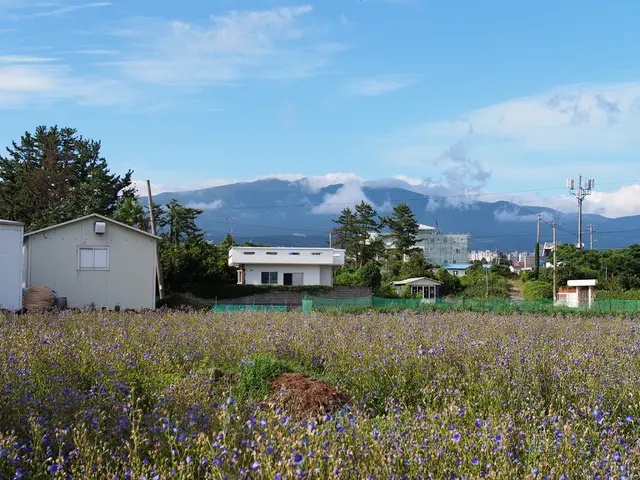Kazakhstan Progresses Joint Endeavors in Renewable Energy Sector
Energizing Central Asia: Kazakhstan's Green Leap Forward
Astana, Kazakhstan, is pushing forward with its green initiatives, confirming a stronger bond in international and regional energy collaborations at the third Green Energy Advisory Council meeting, held in Baku on April 4.
inhabitants of the Caspian Sea will soon witness an engineering marvel, as local power company KEGOC takes on the construction of a deep-sea cable that will traverse the seabed. This visionary project, documented in a recent press statement from KEGOC, forms part of the growing Green Energy Corridor, a trilateral agreement between Kazakhstan, Azerbaijan, and Uzbekistan.
Led by Azerbaijan's President Ilham Aliyev, the meeting centered around the Green Energy Corridor, attended by deputy energy minister Sungat Yesimkhanov of Kazakhstan and KEGOC Chairman Nabi Aitzhanov.
Kazakhstan champions a low-carbon future, driving the development of cleaner solutions such as technologies for the utilization of associated gas and novel green hydrogen projects. The green energy movement has gained momentum in Central Asia, thanks to this trilateral agreement [1].
The agreement's keystone is the construction of a submarine high-voltage cable spanning the Caspian Sea, a project that will significantly boost cooperation between Kazakhstan, Uzbekistan, and Azerbaijan's energy infrastructure.
As the system operator of Kazakhstan's national power grid, KEGOC oversees the assets, including the upcoming deep-sea cable. The underwater cable route will play a pivotal role in the energy infrastructure network, interconnecting the nations and contributing to green energy transmission across the region [1].
At the meeting, the teams presented the technical specifications for the feasibility study, whose funding is secured through donor grants.
The ambitious Green Energy Corridor initiative aims to establish a cross-border renewable energy transmission network, with the ultimate goal of exporting green electricity to Europe. International organizations playing a crucial role in this project include the Asian Development Bank (ADB) and the Asian Infrastructure Investment Bank (AIIB), which have signed an MOU to advance the feasibility study for the Caspian Green Energy Corridor [2].
Through initiatives like the Green Energy Corridor, Central Asian countries envision a future of renewable energy trade with Europe, utilizing Azerbaijan's transit hub status and existing energy corridors such as the Southern Gas Corridor. Embracing green energy is not only a step towards regional energy security but a means of creating economic opportunities and environmental sustainability [3][4].
Despite the project's promising advancements, challenges abound. The technical, financial, and regulatory hurdles necessitate a harmonization of energy policies and sustained investment in cross-border grid infrastructure. Regional collaborations with countries like Turkey, Georgia, and Bulgaria will be essential to extend the corridor's reach into Southeast Europe [3].
The future of green energy in Central Asia shines bright, with the Green Energy Corridor forming a vital piece in this eco-friendly puzzle. The success of this project depends on multilateral cooperation and a sustained dedication to empowering our planet with clean, renewable energy [1][3][4].
[1] Enrichment Data - Purpose and Broader Goals[2] Enrichment Data - Progress to Date[3] Enrichment Data - Overall[4] Enrichment Data - Challenges and Next Steps
- The upcoming deep-sea cable project in Kazakhstan's Caspian Sea, led by KEGOC, is part of the Green Energy Corridor, a trilateral agreement with Azerbaijan and Uzbekistan that aims to promote cleaner solutions such as green hydrogen projects.
- Kazakhstan, under the Green Energy Corridor, is investigating the feasibility of a cross-border renewable energy transmission network with a view to eventually exporting green electricity to Europe.
- The technical specifications for the feasibility study of the Green Energy Corridor are being presented, with funding secured through donor grants. International organizations like the Asian Development Bank and Asian Infrastructure Investment Bank are crucial in advancing this study.
- Central Asian countries, through initiatives like the Green Energy Corridor, envision a future of renewable energy trade with Europe, utilizing Azerbaijan's transit hub status and existing energy corridors such as the Southern Gas Corridor.
- The success of the Green Energy Corridor depends on collaborations with other countries like Turkey, Georgia, and Bulgaria, addressing challenges such as technical, financial, and regulatory hurdles, and creating a harmonized energy policy framework for renewable energy transmission across regions.







